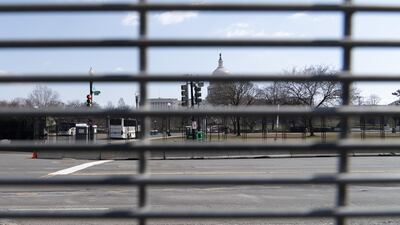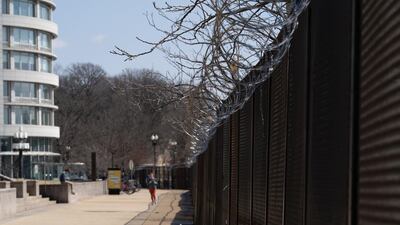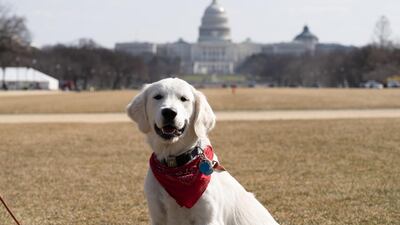Washington was on high alert on Thursday after a warning by US Capitol Police of a “possible plot to breach the Capitol by an unidentified militia group”.
Concern over any repeat of the January 6 attack on the Capitol prompted politicians to move a vote on legislation, planned for Thursday, to Wednesday night and cancel the day's session.
But as of midday, no signs of the threatened attack had been reported.
Since January's riot, cement barricades and metal fences topped with razor wire were erected around the Capitol grounds as a precautionary measure.
Online chat from followers of the conspiracy movement QAnon referred to March 4 as the day former president Donald Trump would return to power.
From early Thursday morning, hundreds of US Capitol Police and armed National Guard stood ready for any attack.
But outside the fortified building the streets were quiet, with only a handful of people near the Capitol.
Lisa Mauck was walking along the National Mall, which leads to the Capitol, with a friend.
Ms Mauck took part in the events of January 6, but said she did not enter the Capitol building and was merely praying and exercising her patriotism.
Ms Mauck returned to Washington this week to visit the Bible Museum. She said it was a coincidence that her trip overlapped with March 4.
“I think it’s ridiculous,” she said of a return to power by Mr Trump.
But Ms Mauck still believes the election was stolen.
"I don't accept that Joe Biden is my president," she told The National.
Where did the threat come from?
March 4 was, until 1933, the day American presidents were inaugurated.
Brad Galloway noticed an increase in online talk about the date among pro-Trump and right-wing groups in the past few days.
Mr Galloway is a former member of the Canadian branch of the US white supremacist group Volksfront.
He now counsels people to avoid these types of groups, helping them to turn away from a life of hate.
Mr Galloway is also a researcher who continues to monitor and study violent extremism in the US and Canada.
He believes that some pro-Trump groups are trying to renew their momentum.

“I sensed some worry in the tonality that I was seeing in some of the places I’ve been looking at, like: ‘If we don't do this, then we’re losing tread, we’re losing traction',” Mr Galloway said.
He said these extremist groups thrive on publicity and media coverage.
“Even if it's a failed road, any kind of attention for these movements is positive in their eyes in terms of their recruitment strategies,” Mr Galloway said.
With thousands of police and National Guard at the ready, it seemed unlikely that any attack would be successful, but Mr Galloway said the militarised reaction could be exactly what these extremist groups were hoping for.
“It can look like that," he said. "That appearance of a secured state like that, well, that means, ‘They’re really worried about us'," he said.












